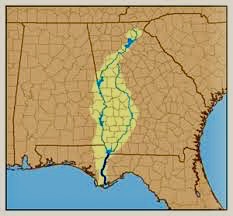A hearing officer has dealt Florida the nearest thing to a fatal blow in its long-running water war with Georgia. In a report last week, the special master, Senior U.S. Circuit Court Judge Paul J. Kelly Jr., found that Florida’s mismanagement – not Georgia’s use of water upstream – is more to blame for the collapse of Florida’s oyster industry in Apalachicola Bay.
However sweeping the report, this case calls for a political accommodation and a smarter strategy for consuming shared state waters.
Florida has long complained that Georgia uses too much water from the Apalachicola-Chattahoochee-Flint River Basin. The Chattahoochee flows south from Georgia to join Alabama’s Flint River and become the Apalachicola River from the Florida state line to Apalachicola Bay.

The bay used to produce 90 percent of all of Florida’s oysters and 10 percent of all the oysters consumed in the U.S. But these days, the industry has dwindled to almost nothing.
The balance of fresh and salt water in Apalachicola Bay is crucial to the growth and development of the oysters there. But the loss of fresh water flow during a 2013 drought turned the bay salty and so damaged the oyster beds that the area was declared a federal disaster. Florida maintains that Georgia farmers and Atlanta-area residents use too much water, decreasing downstream flows and devastating Apalachicola Bay.
But the special master appointed by the U.S. Supreme Court to hear the case disagreed last week. In an 81-page report, Kelly found that Florida failed to make its case. He instead blamed Florida for allowing oysters to be over-harvested and for failing to re-shell the oyster beds. “Florida has not shown by clear and convincing evidence,” he declared flatly, “that the oyster collapse was caused by Georgia rather than another cause (like mismanagement of the resource or drought), and Florida has not shown any other harms to the Bay.”
The ruling is a serious setback following a split Supreme Court decision last year that gave Florida another chance to argue its case. Kelly’s report, made in the form of a recommendation to the court, is a clear victory for Georgia and another hurdle in fairly distributing the basin’s water.
Kelly also said he would not recommend that the court grant Florida’s request for a decree apportioning the waters, finding that Georgia’s water use was “reasonable” and questioning whether the benefits of restricting water use would outweigh the costs.
It should not be the special master’s role to weigh the potential benefits of fairly regulating water use. The court would benefit from further scrutiny in this case.
The special master acknowledged that “low flows played some role in the oyster population decline,” and he further pointed to drought as a significant factor, finding that Georgia “has not effectively curbed” water use by its agricultural sector during dry periods. A fuller appreciation of conservation measures that could come into play might help in resolving this dispute.
The states need a solution that’s fair, enforceable and durable, and which provides for the most efficient use of these natural resources. This latest report from the special master still doesn’t provide a fair basis for ending the case.
“The Invading Sea” is the opinion arm of the Florida Climate Reporting Network, a collaborative of news organizations across the state focusing on the threats posed by the warming climate.



